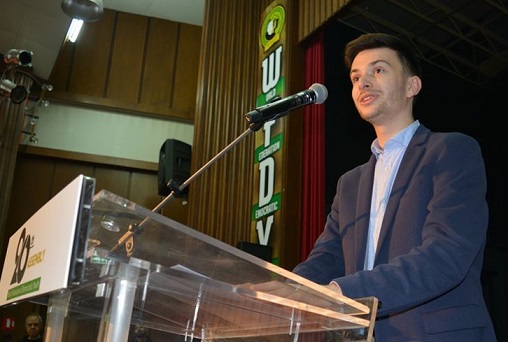How imperialism exploited the spread of the COVID19 pandemic? Have the imperialist interventions stopped during this period?
It is obvious that, in this situation, the most vulnerable to COVID-19 are those who suffer the most brutal face of imperialism. For example, the Saharawi people are denouncing that COVID-19 can hit them very badly due to the conditions created by the occupation. Saharaouis in refugee camps, in occupied territories, political prisoners in Moroccan prisons are at risk. They are denouncing that the situation poses increased risks for them.
On the other hand, the Palestinian people are denouncing the same thing. Palestinian political prisoners in Israeli jails are suffering from the pandemic because their health is not protected inside Zionist prisons.
Countries such as Cuba and Venezuela also denounce the effects of the blockades, unilateral coercion and sanctions on their peoples. These measures could affect access to materials necessary in the fight against COVID-19, so their demand to stop blockades, unilateral coercive measures and sanctions is now more urgent than ever.
Here are some examples of dramatic situations. People suffering from imperialist attacks are experiencing COVID-19 more severely due to the effects of the occupation, the situation of political prisoners, exclusions, unilateral coercive measures and sanctions.
However, at the heart of imperialism, the people also suffered the consequences of the policies of the ruling class. On the one hand, due to the conflicts between the imperialist powers and the capitalist countries to secure health materials, instead of producing and distributing them according to the needs of the people. We have seen several countries fighting each other to get health supplies, masks, respirators and so on. On the other hand, due to the policies developed by the ruling classes during these years, the consequences of the pandemic have also multiplied: cuts in the public health system, reduction of medical staff, retention of employees at work because they put their profits before workers' health.
This system is inhumane. It continued to oppress the people and to be primarily interested in its profits even during a global pandemic.
How WFDY responded from the outbreak of the pandemic until today?
During the pandemic, the anti-imperialist youth has been at the forefront for the organization of solidarity between the youth and the people in the neighbourhoods, workplaces and study centres. Faced with this difficult situation, WFDY shared this work to its member organizations and called for the strengthening of these efforts.
We also denounced the role of imperialism, which I have pointed out in the first question. In this regard, we have shared our analysis of the reasons that have multiplied the effects of the pandemic (privatization of health systems, ruling classes that put their profits before workers' health, etc.) and we have participated in international campaigns. solidarity with COVID-19. In particular, we participated in an international campaign demanding that the UN guarantee the safety of the Saharawi in refugee camps, the occupied territories and the release of political prisoners from the Moroccan prisons. We also took part in a campaign demanding the release of Palestinian political prisoners and the safeguarding of their health, as they are not protected in Israeli prisons. We have also been involved in international campaigns demanding an end to sanctions and unilateral coercive measures against Venezuela and Cuba, etc.
Also, regarding Cuba, we have saluted the excellent example of international solidarity. Cuban doctors go all over the world to help people, including those who exclude them and lie about Cuba.
Finally, we have participated in many online activities, discussions and interviews to share our analysis, talk to young people around the world, answer their questions and show our solidarity in their struggles.
What actions have WFDY’s member organizations taken in their countries?
As mentioned in the previous question, the youth of the member organizations of WFDY organize its action in three areas:
In the neighbourhoods
- Young people collect and distribute food to those who need it.
- Disinfect public areas to stop the spread of the pandemic.
- They are organized to provide assistance in various areas such as shopping, cleaning and so on, especially to those who are unable to do so without assistance (the elderly, people with mobility problems, etc.).
In the workplace
- Employees stopped production when it was not possible to work without the guarantee that they would not be infected.
- Workers and people from the unions made a double effort to ensure workers' rights.
In the study areas
• Pupils and students share their notes, study together and so on to deal with the difficulties of studying at home.
We cannot forget the role that some countries, such as Cuba, have played in this health crisis. Despite the attacks of imperialism, criminal blockade and other difficulties, Cuba has shown the world its commitment to international solidarity by sending doctors and saving lives where needed. This role is remarkable, especially if we compare it to the way in which NATO countries, the European Union and other imperialist powers have waged a "war of pillage".
What are the consequences of the pandemic on the living conditions of young people around the world and what must the youth do to deal with the effects of the pandemic on society?
Some experts are analyzing the possibility of an economic crisis as a consequence of COVID-19. The fall of some markets, the emerging situation for oil, the increase of firings firings and job destruction, etc. There are some indications that a crisis is coming. On this subject, we must ask ourselves two questions:
First, is this crisis a consequence of COVID-19? If you remember, a few months before the pandemic, some were talking about an impending economic crisis. This crisis that we are suffering (or will suffer) was not created by COVID-19. COVID-19 has caused the crisis to arrive earlier. At the heart of the crisis is that this system produces for profit and not for human needs. COVID-19 is neither the problem nor the responsible, the problem is this system based on chaotic production without thinking people's needs.
So, we can say that there is a dialectic relationship between the pandemic and the system. The system has multiplied the effects of the pandemic and at the same time, the pandemic has caused the fastest manifestation of one of the system's cyclical crises.
Second, who will pay for the crisis? Faced with this economic crisis, the capitalist and ruling classes are preparing to make us, the youth and the people, pay for it. Our rights, our working conditions, our wages, our jobs, our lives, are at stake. They will not reduce their profits; they will try to keep them to our expense.
Probably, these are some of the consequences we will see (or see) in our countries:
- Increasing unemployment.
- Worsening of working conditions.
- Reduction of salaries.
- Problems to emancipate or to pay the rent.
- Problems accessing basic products.
- Inability to pay for education.
- Increase in school dropout.
- The youth and the working class will have to get into debt.
- Increasing poverty and sharpening differences between rich and poor.
There are likely to be more examples of the consequences of the crisis that COVID-19 will generate. In any case, these examples are enough to warn that we, the youth and the working class around the world, are at risk. They want to make us pay the consequences of COVID-19.
As we have seen, COVID-19 will likely create an economic crisis and the ruling classes will try to make the youth and the people pay for it. Young people and workers will suffer from deteriorating living conditions. For this reason, another role that we, as a progressive and anti-imperialist youth, must take on is to organize solidarity and the struggle against these attacks on the youth and the people.
• We need to organize solidarity in our workplaces, study centres and neighbourhoods, together with the youth, in order to face the consequences of the crisis. Labour and student unions, solidarity networks, mutual support could be good tools to organize this solidarity. We have some examples during these days where some organizations distributed food, helped with disinfection, and so on.
• We must organize solidarity among the peoples of the world. At this point, the World Federation of Democratic Youth has an important role to play. The International Solidarity Fund, the International Solidarity Campaigns, etc. are some ideas we can develop.




